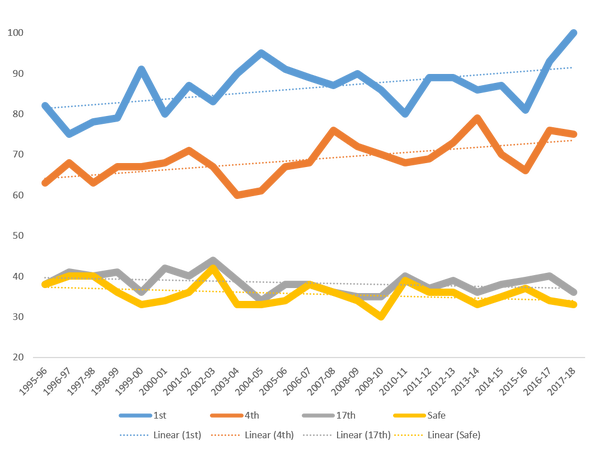With the dust settling on the 2017/18 Premier League season, preparations for the league's return in August are already gathering pace. With World Cup 2018 on the horizon, club activity usually occurs in two bursts. before and after the tournament, making World Cup years feel somewhat different.
This is no more evident that the recent sacking/parting company of Premier League managers in the past number of days. Arsenal have been joined by West Ham United, Everton, and today Swansea and Stoke, who are all seeking a new managerial appointment.
In a previous post, I illustrated the downward trend in the number of days managers stay in their job, which the League Managers Association chief Richard Beven described as "embarrassing" for the sport. His words have had little effect on club owners.
During the 2017/18, excluding the recent exists of Arsene Wenger, David Moyes, Sam Allardyce, Carlos Carvalhal and Paul Lambert, ten managers lost their jobs. This includes two changes at West Bromwich Albion. That's a total of 16 managerial changes.
The pressure that managers come under, particularly at the start of the season, seems to be growing year on year. Within this, the league itself appears to be breaking into two groups. Teams fighting for the top 4 and teams in a relegation battle.The mid-table appears to be disappearing. In fact, this season one could argue only Burnley and possibly Watford (although their season tapered off) were not in a relegation battle or in with a realistic chance of reaching the top 4.
The graph below would support this somewhat, and illustrates how the league is squeezing out the mid-table teams.
The number of points required to win the league and finish 4th (last Champions League place) is upward trending. The points needed to survive is downward sloping.
As a general rule, 40 points is used as a benchmark for safety. One would have to go back to 2002/03 to find the last time 40 points was actually required to be safe. in the past five seasons, an average of just 34.4 were required to stay in the division. The average from 1995-96 to 1999-00 was 37.4
On the other hand, the number of points needed for the top 4 is climbing. Just 65.6 points were required in the first five seasons show above. Since 2013-14 this has risen to 73.2. In the first twelve seasons (1995 to 2007) only once did the 4th place team break 70 points. In the eleven since May 2007 the 4th placed team was broken 70 points on 8 occasions. Arsenal finished 4th in 2013-14 with a whopping 79 points.

 RSS Feed
RSS Feed